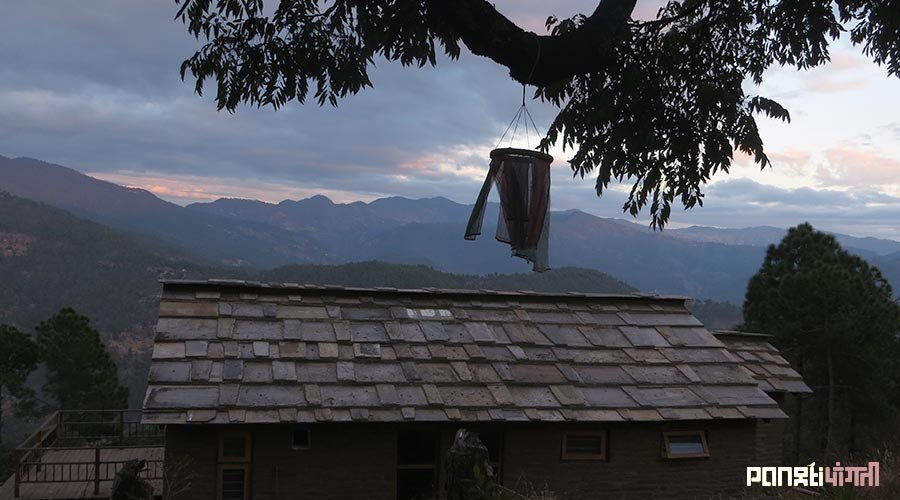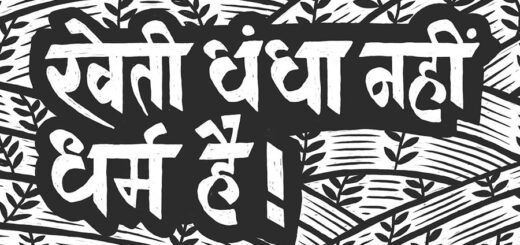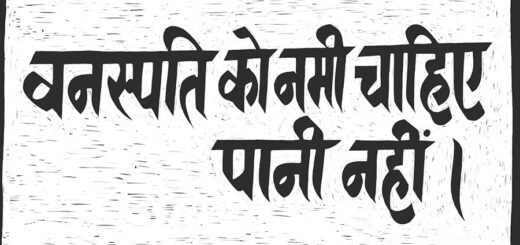Natural farming and Democracy
The concept of Natural farming and its practice sounds like a piece of cake. Only after failing to make initial headway did we realize that it is quite like democracy. Just because an idea is viable and good does not necessarily mean that it will work!
The term natural farming is attributed to Japanese farmer Masanobu Fukuoka. He philosophized this ecological farming approach which is also known as ‘natural way of farming’ or ‘do nothing’ farming. ‘Do nothing’ does not mean sitting idle on a branch of tree and watching the crops grow. It basically means non-usage of industrial inputs and equipment, non-interference with the natural ways in which plants grow and flourish, and curbing the human desire to control the outcome of natural processes.

When we moved back to the land, in Uttarakhand, we took ‘do nothing’ too literally. The farmland we moved to was lying barren for over 15 years. The neighbours had ensured monoculture of wild grass because that was the only produce which was of value to them. Barring few board leaf trees, the fields were covered with pine trees, and the land littered with pine needles. The wildfire markings on the tree trunks stood testimony to the heat and dust this land had witnessed.
The history of the land was interesting though. Once upon a time the land had a natural spring which provided enough water for the cattle and met minor irrigation needs. We were told that literally everything grew here – from grains and greens. History gave us hope. We were going to, after a gap of one and a half decade, re-harness the potential of this land.
We started off with planting seeds, all local varieties, on the hard barren land. We designed a manual device that allowed quick sowing of seeds. To our pleasant surprise, there was decent amount of germination. We also made and dispersed seed balls but somehow they did not work for us. With regards to trees – we opted for local wild species as well as fruit bearing trees. We avoided grafted and hybrid varieties because we wanted our farm to be as natural as possible. We also put in efforts to make a living fence. And then we waited…
We waited… and waited… and waited… but the natural process did not kick-off!

After failing for two crop cycles, we initiated shallow tilling. Plenty of grass still grew on our land, which we bartered for cow dung manure. We experimented with many techniques like panchagavya, biodynamics, etc. Things got better but it was still a fry cry from the history we wanted to recreate. As I had to spent significant amount of my time on my client projects and writing, Deepti took charge of the land. As the primary driver of the process and caretaker of the land, she was getting extremely frustrated not just with the whole process but also with an unending onslaught of birds like parrots, mynas, wild hens and other partridges, wild animals like barking dear, porcupine, wild rabbit, wild boar, etc., the omnipresent field rats and of course the goats and cows of our neighbours.
A natural farmer had once told us that it is natural for wild animals and birds to feed on a farm and that they would not take anything more than one-third of the produce. Wild species are not greedy, he said. And we believed him completely. But what we encountered was a different reality altogether. It almost felt as if we were growing solely to feed the nature. We had never thought that farming would get this frustrating.
Then we sat back and wondered what all has gone wrong and why? What is our contribution to the process and what are the external factors which are influencing the outcomes?
We came to the following conclusions –
- For natural farming practices to work, the land in question also has to be natural. And if it is not, then it has to be worked upon. The land we inherited had monoculture of grass and trees – a highly unnatural configuration. To mitigate this we have to add enough biomass to the soil, keep on with shallow tilling to hasten the process of soil regeneration and let diversity of trees and shrubs grow so that the soil regains its natural self.
- A forest does not need any help to grow. It is fairly capable of growing on its own, provided that various animal species, including humans, do not interfere. Just by barricading the land, to stop unnatural grazing, various kinds of trees and shrubs have started to grow. As we do not want a forest, we prune some trees and relocate the others.
- It is tough to reduce the onslaught the animals and birds because hardly anyone is farming in the neighbourhood. We cannot do much about it apart from standing guard, and hoping that one day the vast stretches of land lying abandoned will get tilled. For that to happen we will have to wait for sense to prevail, amidst the bureaucracy and academia, so that the government realizes that Himalayan fields cannot be irrigated. We have no option other than promoting traditional local seeds accustomed to rain fed agriculture.
- Climate change seems to have brought in erratic weather pattern – excessive downpour over a short period of time to highly uneven distribution of rains. To mitigate these adverse effects we have no option but to ensure large scale afforestation and reforestation so that our forests transition from monoculture of pine to mixed forests which will nurture soil as well as plant and animal species.
To sum it up, natural farming is not about our desire to do something naturally but to help re-establish the connections between various elements of nature so that the intrinsic rhythm of nature and its inherent bio-diversity returns. Natural farming is not about fixing things but about playing our role in recreation of that symphony on which nature likes to dance. Achieving equilibrium in one farm alone is not going to change things. In fact, such an equilibrium does not sound achievable at all because a farm cannot exist is isolation, naturally!

So what has this go to do with democracy?
- Well, conceptually democracy is much like natural farming. For it to work, all its elements need to be in rhythm. Democracy is not just about deployment of a political framework or announcement of a preamble. Democracy is not a theory but a realized practice.
- Just like natural farming, democracy sounds pretty logical and obvious. Both of them come across as low hanging fruits which anyone can pluck at any point of time. Sadly, that is not true.
- Just as natural farming is not a technique but a viewpoint, democracy too is not a technique but a viewpoint – a viewpoint where we exist within the system and not outside. So if democracy has ills, it is because we are collectively contributing towards those ills. For democracy to work, we need to work toward making it work.
- Just like natural farming, democracy too thrives on the idea of individual sovereignty and equality, achieved at the expense of no one else. It believes in the importance and contribution of each individual element. It is a system with inbuilt checks and balances, federalism, individual rights, and separation of powers. Democracy does not exist because people want it. It exists because people believe in the values that it stands for.
- Just like natural farming, democracy is a delicate balance between freedom for an individual and the rights of the society as a whole. Every element of an ecosystem is free to realise its full potential provided it does not disturb the ecosystem itself.
For democracy to function like natural farming, people need to become natural people. And natural people are honest people who believe in co-existence based on a shared value system which is not predatory in nature.
Sadly, we want to practice democracy but the land on which we want practice it is not in its natural state. Every aspect of our lives is governed by our biases and polarization along various lines like religion, caste, class, gender, colour, region, etc. We are unable to leave aside these allegiances even while voting for television reality show, forget something as important as choosing a political representative.
Frankly speaking, we have ceased to be an honest society. Our democratic institutions, at all levels, seem to be led by people whose sole objective is to harness money or power or both. So when we talk of democracy it almost sounds like an aspiration to grow healthy organic food through industrialized processes and external chemical inputs. It is high time we realize that democracy is not a political system but a political view. Hence if there is a failure, it is our failure and not that of democracy.
I end this note with what Fukuoka said –
“The ultimate goal of farming is not the growing of crops, but the cultivation and perfection of human beings.”
Perhaps same is true for democracy as well!














Dajyu Namashkaar,
It thrills every time to realize how the functional design repeats itself among apparently unrelated aspects of our existence but a diligent task to pen it down.
Thanks for sharing about your exposure to natural farming. It is indeed a steep learning curve !
Also the pictures are nice 🙂
Regards
thanks!